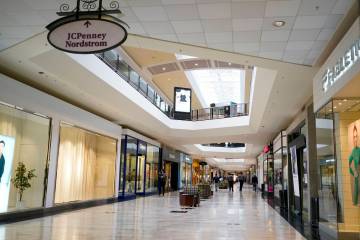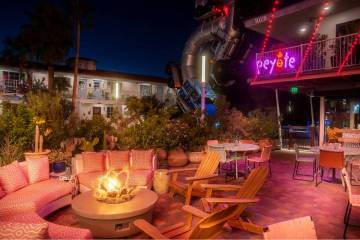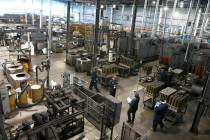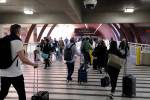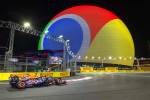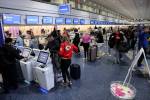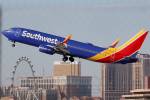PATHS TOWARD PROGRESS
As Las Vegas resorts embark on their biggest-ever building boom, tourism boosters and airport officials in Southern Nevada are going further afield to recruit visitors.
Attracting more overseas visitors, who stay longer and spend more in Sin City than American tourists, is critical if Southern Nevada hotels want to maintain occupancy rates near 90 percent as the room inventory increases 35 percent to nearly 180,000 by 2011.
That's why tourism boosters at the Las Vegas Convention and Visitors Authority and officials from McCarran International Airport are heading to Sweden early next week for a conference of the world's largest airline-route planners.
They'll meet with people from more than a dozen airlines from five different continents in an attempt to attract more direct and nonstop international flights to Las Vegas.
"We are talking to people who have a lot of influence on where these airplanes are going to fly," said Randall Walker, director of the Clark County Department of Aviation. "These are good people to talk to."
McCarran is already the sixth-busiest airport in the United States and has scheduled international service from Canada, Germany, the United Kingdom, Korea, Mexico and the Philippines.
But boosting service from existing markets and finding new markets is still important for keeping pace with the pending hotel room boom. To maintain current occupancy rates Southern Nevada needs to attract 200 new visitors for every new hotel room, according to the authority.
Combined, the airport and the authority are spending about $29,000 to send two delegates to the World Route Development Forum conference in Stockholm.
They're also offering up to match what an airline spends marketing new, overseas service to Las Vegas, up to $250,000.
Not only does Las Vegas need new guests to fill rooms, it faces new competition for visitors from emerging resort destinations like Macau, Dubai and Singapore, among others.
"As a destination, we are competing with countries," authority President and CEO Rossi Ralenkotter said.
The high value of direct international service to a community also means competition from domestic destinations.
A study in 2001 by George Mason University reported that direct service from a European market could mean as many as 2,900 new jobs for a region. Assuming a new job is worth about $55,000 annually, the study estimated that service from a single international market could be worth as much as $160 million per year.
The benefits from adding new markets decrease as service expands. For example, increasing from 20 to 21 markets stimulates just 440 jobs, according to the study, which focused on the creation of what authors called, "new economy" jobs, meaning work in the skilled, high-technology fields.
In Las Vegas international service is valued because it brings in higher-spending visitors.
A typical foreign visitor will spend nearly $1,400 during a Las Vegas trip, not including gambling. The overall average spending, not including gambling, is about $900, according to the authority's research.
The extra money foreign visitors spend on everything from shows, food and shopping a large part of the reason the authority wants to increase the mix of foreign travel to Las Vegas from 12 percent to 15 percent by 2010.
Ralenkotter divides foreign markets into categories. Major markets such as Canada, the United Kingdom and Mexico are the biggest contributors of Las Vegas visitors. Primary markets are almost as important and include Australia, France, Germany, Japan and South Korea. Emerging markets are places that could supply a healthy portion of future tourists and include Brazil, China, India and Russia.
Whether attending the conference will produce a good return on investment for Las Vegas won't be known for awhile.
Michael Boyd, an airline industry consultant in Colorado, said the conference isn't an event that produces new service for communities.
"The substance is when they go directly to the airline one-on-one and talk," said Boyd, whose firm hosts its own airline conference. "(Routes) is not real air service development. That is schmoozing."
But recruiting new service is a long-term affair, Walker says. Las Vegas delegates networked with airline officials for nearly a decade before they landed direct service from the United Kingdom on Virgin Atlantic in 2000, he said.
He said the value at Routes is an opportunity to network with more than a dozen airlines on one trip as opposed to visiting individually with each airline at its headquarters. That comes later.
"I wouldn't say you are going to close anything at Routes," Walker said. "That is where it starts."




